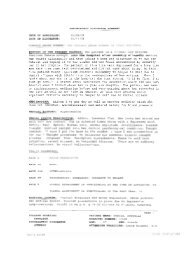C - Organized Mobbing
C - Organized Mobbing
C - Organized Mobbing
You also want an ePaper? Increase the reach of your titles
YUMPU automatically turns print PDFs into web optimized ePapers that Google loves.
Attempting to Know and Control the opposition 515<br />
, personal engagements and similarly intense quarrelsome breaks, sugthat<br />
both might have suffered from what psychopathologists now call<br />
bipolariv. It appears that both had signed on to working with the Stasi as<br />
, means to realize their dreams about a proper socialist society. They were<br />
excellent informants for the Stasi, but they also played their own games in<br />
T,-hich they (with naive grandiosity) hoped to use the secret police as much<br />
as the Stasi expected to use them.<br />
.At least five of the six secret informants under consideration here were<br />
at some level very lonely people. Hager's longing for a mother and a friend<br />
were constantly disappointed. Kaminski lost most of his friends during his<br />
time in prison. Miiller had always been a loner. Bohme, who typically managed<br />
to place himself in the middle of a corona of fans who were charmed<br />
by his unconventional, quirky character, was also ready to drop them at a<br />
moment's notice, thro~4lng himself into new relationships seemingly with<br />
the same abandon with which he had entered the ones he now severed so<br />
abruptly. And even though Winkler seemed to be always in love, always<br />
with friends, he too abandoned lovers, friends, and family, it seems without<br />
much hesitation. This loneliness was constitutive of their new roles, which<br />
did not leave them the time to manage other intensive or extensive networks<br />
of social relations. It was important for their work as informants that they<br />
would not miss anyone too much and that others would not miss them all<br />
that much either when the informants spent several weekday evenings and<br />
most weekends in the company of the people to be spied upon.<br />
With the exception of Kaminski, none of them had anybody but their<br />
guidance officer who knew both sides of their existence. Therefore, only<br />
their guidance officers were in a position to recognize the goodness of their<br />
self-understandings as spies. More, as they lost other ties, the officers also<br />
became vital links to their own pasts, their real biographies rather than their<br />
cover stories presented in meetings with the movement activists. In some<br />
cases, as for Monika Hager, this led to intensive relationships with their<br />
guidance officers, who appeared more and more friendlike. In other cases<br />
this led to tensions, because the guidance officers were unable to strike the<br />
kind of rapport the informants wanted or even needed. Then other satisfactions<br />
moved to the foreground, such as the constant reminder that they were<br />
important (why else would secret police officers want to meet them in the<br />
middle of the night in some car?). Werner Miiller says that he very much enjoyed<br />
the fact that he could determine when the meetings were taking place.<br />
For once, he felt in control. Bohme and Wolf seemed to have enjoyed their<br />
intellectual superiority over their guidance officers, which afforded them the<br />
feeling that in the end they knew better than the party state!<br />
This situation created a remarkably skewed social world, a very unique<br />
authority network structure. On the one hand the informants had frequent,





